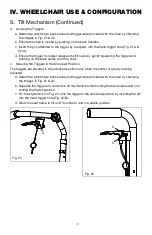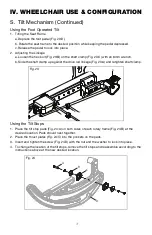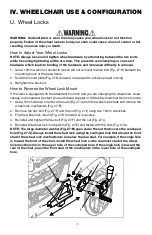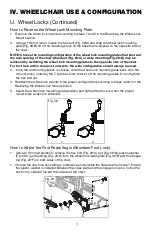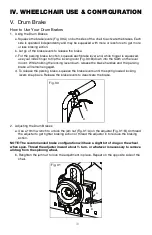
43
V. MAINTENANCE AND CARE
D. Disposal
The construction of wheelchairs’ and the Ki Power Tilt System poses no known hazards in
preparation for disposal or materials that present a biohazard for disposal. Damage to the RCB-
10 control box could result in battery acid leakage. Take precaution and wear hand and eye
protection when handling is necessary.
Specific waste disposal or recycling regulations may be in force locally and these should be
taken into consideration when disposal arrangements are made. This may include the cleaning
or de-contamination of the wheelchair before disposal.
If recycling of materials is a requirement, please refer to the following list of general materials
used in the components of the wheelchair:
•
Aluminum - Frame, caster fork, caster mount, bearing housing, camber tube assembly,
backrest mount plates, backrest frame, backrest release bar, push handles, footrest
tubes, footplate, seat rails, handrim and wheel rim.
•
Steel - Fasteners, QR axles, caster stems, backrest release latch, wheel spokes, bearings
and axle sleeve.
•
Plastic - Rear wheels, caster tires, push handle grips, armrest pads and tube plugs.
•
Upholstery - Woven polyester fabric and polyurethane foam.
If recycling of materials is desired or a requirement, such as per Directive 2012/19/EU, WEEE
(Waste Electrical and Electronic Equipment) in Europe, both REAC and Mascot are compliant to
WEEE and provide guidance on recycling and disposal. Proper dismantling is necessary to
achieve a high proportion of reuse or recycle. Care to use proper tools and protective measures
in handling are required to avoid contact with sharp edges.
Plastics marked with recycling symbols and thermoplastic parts can be recycled. Aluminum,
copper and steel parts, including fasteners, may be recycled. Cables, batteries and PCB are to
be disposed separately per local requirements.
Return your chair and accessories to your authorized supplier for proper disposal if you are not
comfortable or able to dispose of your wheelchair properly.


